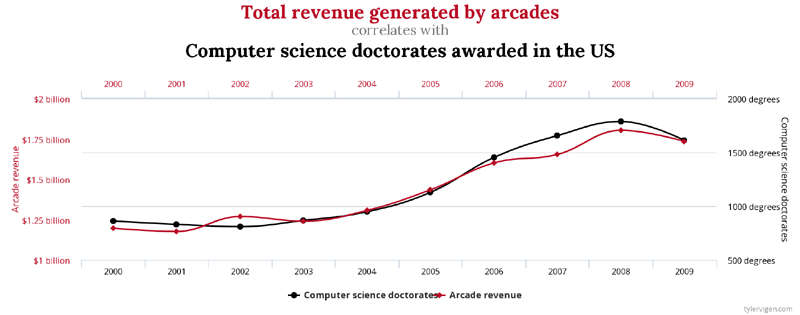Google Answers If Domain Age Impacts Rankings

Someone on X (formerly Twitter) asked if domain age impacted search rankings. Google’s John Mueller sets the record straight.
The person asking the question tweeted:
“Does the age of a domain name impact Google search rankings?”
SEOs have for a long time noticed that older domain names correlate with top rankings.
But correlations are generally a poor foundation for understanding the world.
For example, the number of computer science doctorates awarded in the United States correlates exactly with the video game arcade revenues.

What Google’s John Mueller Said About Domain Age
Google’s John Mueller tweeted:
“Primarily those who want to sell you aged domains :-)”
And if that’s too ambiguous for some people, Mueller has previously tweeted:
“No, domain age helps nothing.”
Why Do SEOs Believe Domain Age Matters?
SEOs have believed for almost twenty years that domain age matters, that it was even an important ranking factor.
The idea may have evolved from a patent Google filed called Information retrieval based on historical data.
The patent mentioned domains in the context of historical data. But the patent didn’t really say what SEOs thought it did. Their reading of that patent was 100% incorrect.
The patent has an entire section titled, Domain-Related Information where domain related information is used to identify spam sites.
Identifying spam sites is not the same as giving bonus ranking points if a domain has been registered for a long time.
The patent says it uses domain data to catch throwaway domain names used by spammers:
“Individuals who attempt to deceive (spam) search engines often use throwaway or ‘doorway’ domains and attempt to obtain as much traffic as possible before being caught.
Information regarding the legitimacy of the domains may be used by search engine when scoring the documents associated with these domains.”
Next it says that normal sites tend to have domains that are registered for a long periods of time, which is not the case for throwaway domains.
Here’s where SEOs misread the patent. This information is not used to rank “legitimate” domains. The registration data is used to find spam sites.
Here’s what it says:
“Valuable (legitimate) domains are often paid for several years in advance, while doorway (illegitimate) domains rarely are used for more than a year. Therefore, the **** when a domain expires in the future can be used as a factor in predicting the legitimacy of a domain and, thus, the documents associated therewith.”
That statement is within the context of identifying “illegitimate” domains. There’s nothing there that talks about promoting legitimate domains, only for identifying spam domains, that’s the context.
SEOs have a long history of seeing what they want to see. But it’s really clear that the domain history information is used for finding spam, not for generating a ranking signal.
In that same section it talks about using DNS history information for identifying spam sites:
“By analyzing this data over time for a domain, illegitimate domains may be identified.
…a list of known-bad contact information, name servers, and/or IP addresses may be identified, stored, and used in predicting the legitimacy of a domain …”
Lastly, the patent says that the newness of a name server isn’t necessarily a bad thing, but rather, the newness of the name server data AND other data points together could mean that the domain is spam.
“The newness of a name server might not automatically be a negative factor in determining the legitimacy of the associated domain, but in combination with other factors, such as ones described herein, it could be.”
Microsoft filed a similar patent from 2006 that discusses using the domain age of the backlinks for identifying spam sites.
The “background” section of that patent reveals the purpose of the patent is for finding spam sites. The patent was created because the cost of domain registrations became cheap (they used to cost around $70/year in the late nineties).
The patent says:
“Spammers often take advantage of such offers through a spam technique known as a web farm. In particular, spammers purchase or otherwise obtain a large number of sites and interlink the sites together to increase the sites’ rankings by artificially increasing the number of contributing domains for some or all of the sites.”
John Mueller is telling the truth. Domain age is not used for ranking purposes. There is no patent that suggests such a thing.
Featured Image by Shutterstock/Just dance
Source link : Searchenginejournal.com



